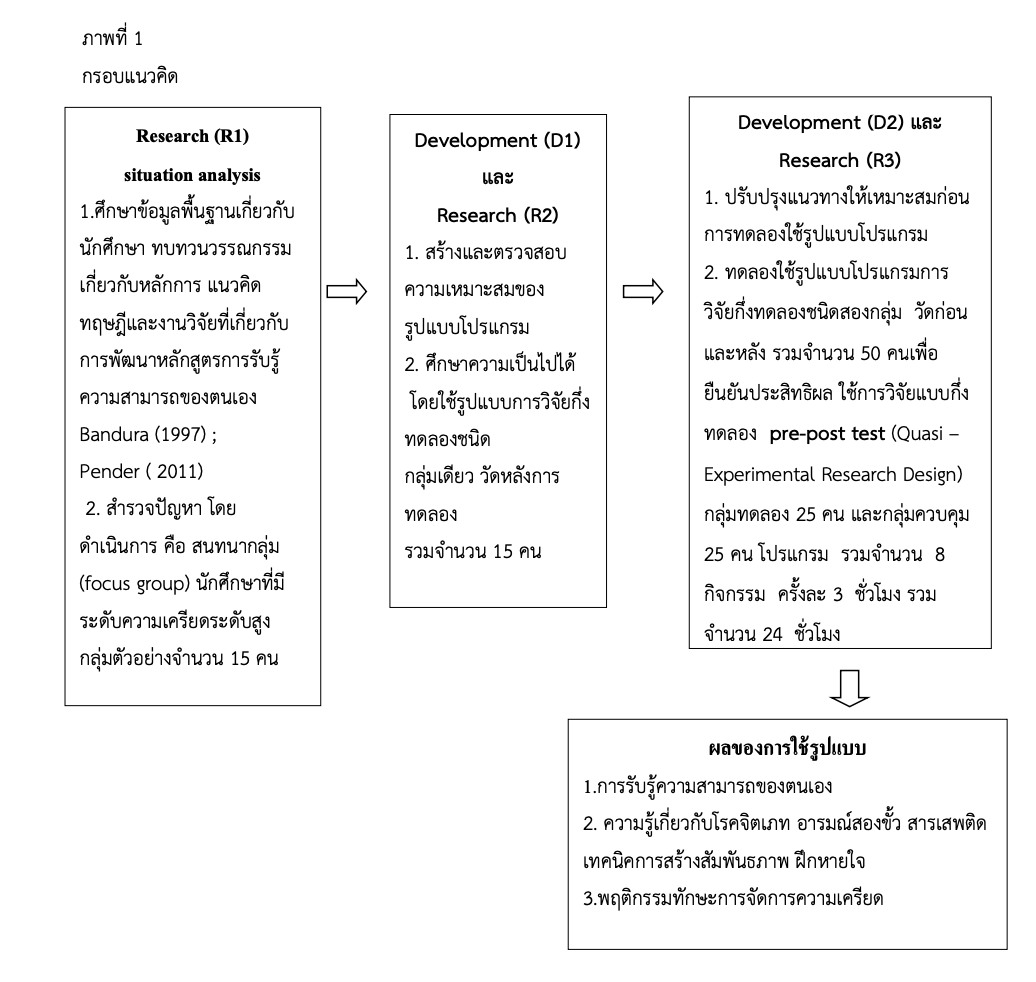THE SELF-EFFICACY MODEL DEVELOPMENT AMONG STUDENTS NURSES IN STRESS MANAGEMENT SKILLS FOR MENTAL HEALTH AND PSYCHIATRIC NURSING PRACTICUM
Main Article Content
Abstract
Introduction: Development of a self-efficacy model for stress management skills in psychiatric nursing practice for nursing students Objective: The study purpose was to develop and to study the effectiveness of the Self-Efficacy Model Development Program. The Research were Research and Development had in 3 phases. Phases I was the development based on a need assessment about stress Management skills. The data was collected by focus groups. The data obtained was analyzed using content analysis. In Phases II, the curriculum tested on 15 nursing students who were stress. After testing the program was developed. In Phase III, an experimental research design was undertaken to examine the effectiveness of the model using a quasi- experimental approach. The control and experimental comprised 25 nursing students. The data tests were analyzed by using descriptive statistics; percentages, means and standard deviation. The data was also analyzed using paired-t-test. The questionnaires had construct validity. Reliability was tested using Cronbach’s alpha co-efficient on variables such as; knowledge 0.82, Self-Efficacy 0.82, and Behavior stress Management skills 0.84. They were summarized: 1) The Program Development form Bandura (1997). The Program Development for Self-Efficacy focused on the concepts of Mastery Experience; self-analysis, Motivation, group, Vicarious Experience Verbal Persuasion, monitoring physiological and affective States was based on Motivation, Goal Setting. All Program had 8 main parts 24 hours 2) The effectiveness results showed that after participating the program, The experimental group had a statistically significant score on Self-Efficacy at the .01 level of significance.The experimental group had statistically significant scores on Behavior stress management skills, higher than the control group at the .01 significance level. Conclusion: Therefore, the study shows effectiveness of the program in helping nursing students regarding stress management.
Article Details

This work is licensed under a Creative Commons Attribution-NonCommercial-NoDerivatives 4.0 International License.
The author(s) is only responsible for data appearing in the submitted manuscript of Interdisciplinary social sciences and communication journal.Besides, this journal encourages and enables you to share data such as statements, contents, figures, etc. that support your research publication where appropriate, and enables you to interlink the data with proper citation.
References
กระทรวงสาธารณสุข. (2559). กรมสุขภาพจิต: คู่มือคลายเครียด (พิมพ์ครั้งที่ 6). กรุงเทพมหานคร.
ฐิตวันต์ หงษ์กิตติยานนท์. (2566). โปรแกรมการพัฒนาการรับรู้ความสามารถของตนเองเพื่อป้องกันภาวะซึมเศร้าของผู้สูงอายุในชุมชน .วารสารวิทยาลัยพยาบาลพระปกเกล้าจันทบุรี, 41(2), 78-86.
ชุทิมา อนันตชัย. (20, มิถุนายน 2566 ). การศึกษาสาเหตุ ระดับความเครียด และการเผชิญความเครียดในการฝึกภาคปฏิบัติของนักศึกษาพยาบาล มหาวิทยาลัยวงษ์ชวลิตกุล . http://www.vu.ac.th/Joural/54feb-54jun/journal03.pdf
รติกร ลีละยุทธสุนธร. ( 2559 ). ความสัมพันธ์ ระหว่างตัว ก่อให้เกิดความเครียดในงานความเครียด
วิธีการจัดการกับความเครียดและวิธีการจัดการความเครียด โดยมีความอดทนต่อแรงกดดันความต้องการสำเร็จและความต้องการสัมพันธ์เป็นตัวแปรกำกับ. [วิทยานิพนธ์ปริญญามหาบัณฑิต ไม่ได้ตีพิมพ์]. จุฬาลงกรณ์มหาวิทยาลัย.
ณัฐธัญญา ประสิทธิ์ศาสตร์ .(2561). ผลของโปรแกรมเสริมสร้างแรงจูงใจภายในตอ่ทักษะการจัดการความเครียด
ของนักศึกษาพยาบาล. [วิทยานิพนธ์ปริญญามหาบัณฑิต ไม่ได้ตีพิมพ์]. มหาวิทยาลัยธรรมศาสตร์.
วันเพ็ญ หวังวิวัฒน์เจริญ และสาระ มุขดี. (2559). ความเครียดของนักศึกษาพยาบาล วิทยาลัยพยาบาลเกื้อการุณย์.วารสารสมาคมจิตแพทย์แห่งประเทศไทย 2539, 41(2) : 78-86.
วิไลพร ขำวงษ์ และคณะ. (2559). ความสัมพันธ์ระหว่างระดับความเครียดกับสาเหตุของความเครียด และการจัดการความเครียดของนักศึกษาพยาบาลในวิทยาลัยพยาบาล สังกัดสถาบันพระบรมราชชนก. วารสารวิจัยทางวิทยาศาสตร์, 10(1),78-87.
สุจิตรา กฤติยาวรรณ. (2561, 25 พฤษภาคม). ความเครียดและการเผชิญความเครียดในการฝึกปฏิบัติรายวิชาการ พยาบาลพื้นฐานของนักศึกษาพยาบาล มหาวิทยาลัยราชธานี. การประชุมวิชาการและนำเสนอผลงานวิจัยระดับชาติ ราชธานีวิชาการ ครั้งที่ 3 นวัตกรรมที่พลิกโฉมสังคมโลก อุบลราชธานี.
Bandura, A. (1997). Self-efficacy. The Exercise of Control. New York: W.H. Freeman and Company.
Pender, N.J., Murdaugh, C.L., & Parson, M.A., (2011). Health promotion in nursing Practice (6 ed) . Pearson Education.
Schwarzer, R. (1992). Self-efficacy in the adoption and maintenance of health behaviors: Theoretical approaches and a new model. In R. Schwarzer (Ed.). Self-efficacy: Thought control of action. (pp. 217-242). Washington, DC: Hemisphere.
Selye, H., (1976). The Stress of Life (rev. edn.). McGraw-Hill.


